1 人教版高中英语必修1 Unit 3 Travel Journal 语法:现在进行时表将来课件(共17张)
文档属性
| 名称 | 1 人教版高中英语必修1 Unit 3 Travel Journal 语法:现在进行时表将来课件(共17张) |

|
|
| 格式 | zip | ||
| 文件大小 | 2.4MB | ||
| 资源类型 | 教案 | ||
| 版本资源 | 人教版(新课程标准) | ||
| 科目 | 英语 | ||
| 更新时间 | 2020-03-25 00:00:00 | ||
图片预览


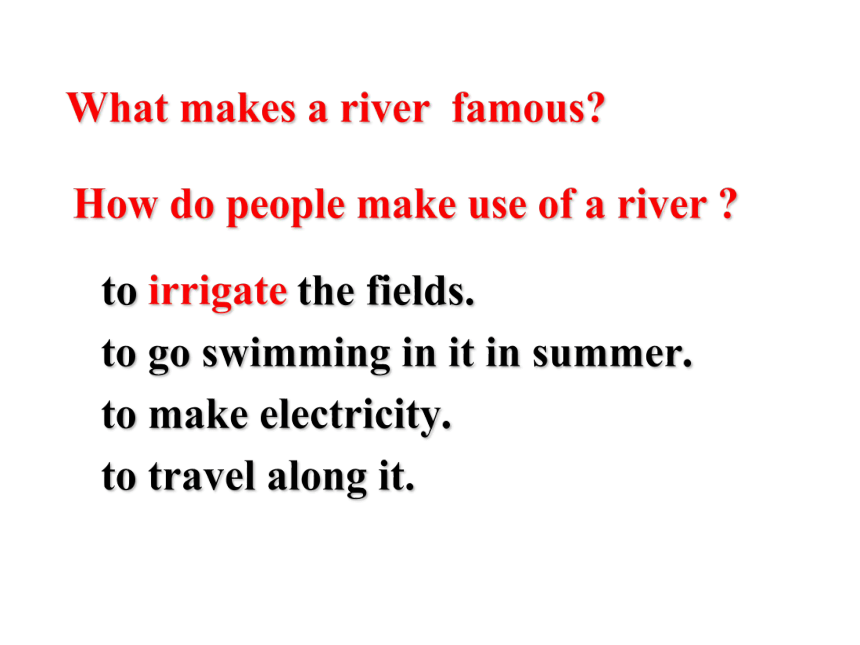
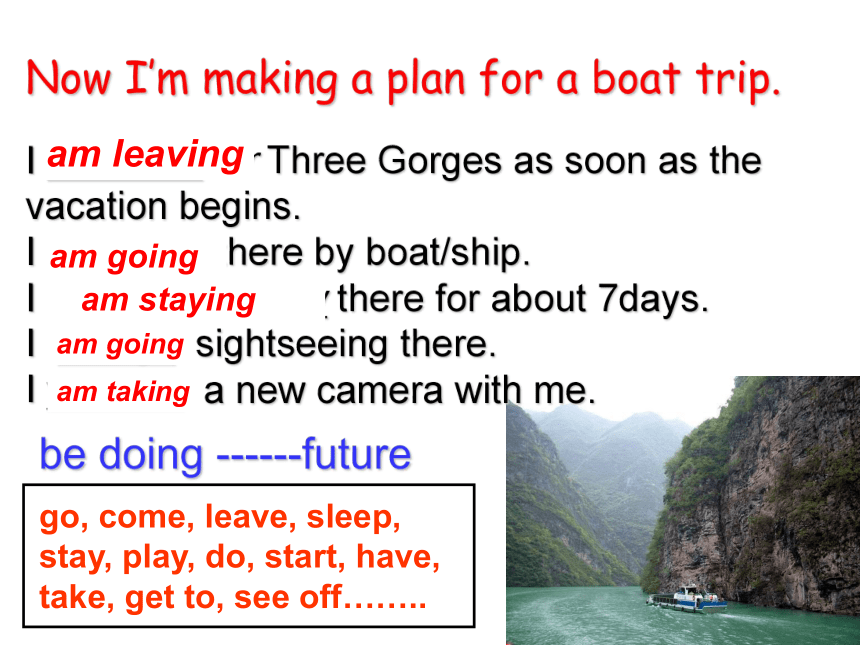
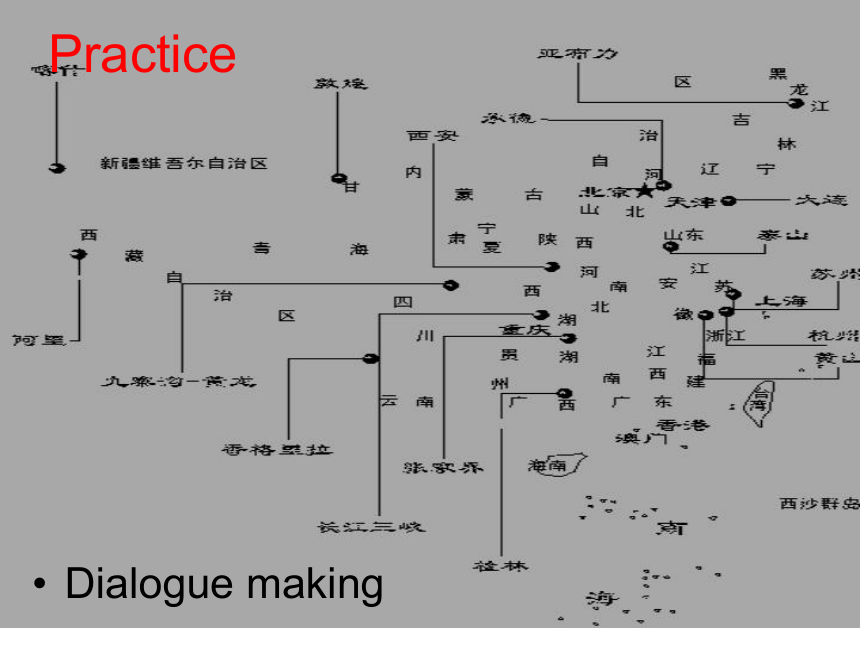
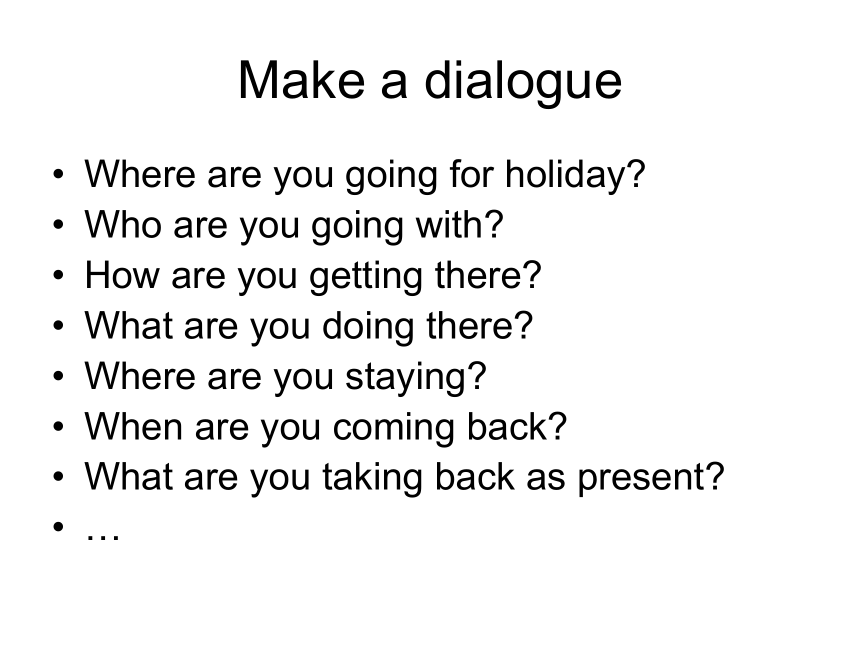
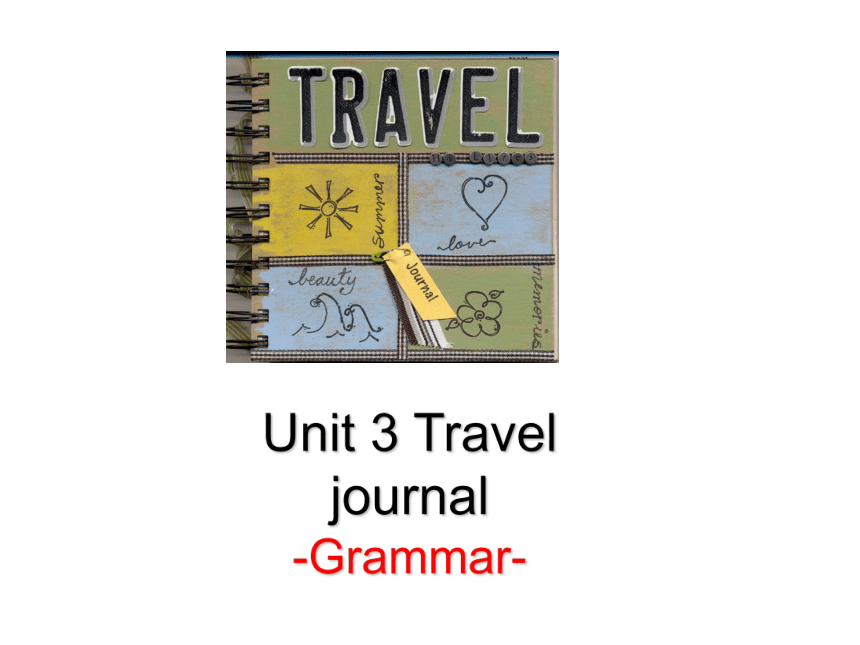
文档简介
(共17张PPT)
Unit 3 Travel journal
Yangtze
Amazon
Can you guess what the names of these rivers are?
Yellow
Pearl
Nile
How do people make use of a river ?
to irrigate the fields.
to go swimming in it in summer.
to make electricity.
to travel along it.
What makes a river famous?
I will leave for Three Gorges as soon as the vacation begins.
I will go there by boat/ship.
I am going to stay there for about 7days.
I will go sightseeing there.
I will take a new camera with me.
Now I’m making a plan for a boat trip.
am leaving
am staying
am going
am taking
am going
be doing ------future
Practice
Dialogue making
Make a dialogue
Where are you going for holiday?
Who are you going with?
How are you getting there?
What are you doing there?
Where are you staying?
When are you coming back?
What are you taking back as present?
…
Unit 3 Travel journal
-Grammar-
现在进行时(present continuous tense)表示将来
1. Usage
现在进行时表示将来常有“意图,安排”或“打算”的
含义. 它常表示最近或较近的将来.
2. Verbs
下列动词的现在进行时常常表示将来意义.
go, come, arrive, leave, start, fly, get, meet,
return, sleep, spend, stay等
Practice
我们下星期天要去德国。(go)
2. 明年冬天我们要在法国度过。(spend)
3. 我要带你去看大海。(take)
4. 他要离开这里去伦敦。(leave for)
We are going to German next Friday.
We are spending next winter in France.
I am taking you to the sea.
He is leaving for London.
5. 这周末和我们一起吗?(stay)
6. 长大后,我要参军。(join the army)
7. 如今,树木逐渐遭到砍伐。(cut off)
Are you staying with us this weekend.
When I grow up, I am joining the army.
Nowadays, a large number of trees are being
cut off.
一般将来时的类型:
1.助动词will或shall+动词原形
2. be going to+动词原形
4. 一般现在时表示将来
3. be+动词不定式
5. be about to +动词原形
(1) “预言”我们认为将会发生的事情
E.g. 少吃多练,你会发现保持健康很容易
1. will或shall+动词原形”
(2) 表示作出承诺或正式作出决定.
E.g. 我不会再迟到了。
Eat less and take more exercise, and you will
find it easy to keep healthy.
I will not be late again.
2. be going to+动词原形
(1) 表示近期或事先考虑过的将要发生的动作
“打算;计划”。
E.g.我们打算在校门口见面
(2) 有迹象表明必将发生某事
E.g. 瞧瞧那乌云,天要下雨!
We are going to meet outside the school gate.
Look at the dark clouds, it is going to rain!
3. be+动词不定式 指安排好要发生的事情
Exx. 我们将于下周五举行运动会。
We are going to have our sports meet next Friday.
We are to have our sports meet next Friday.
明年他将访问日本。
He is to visit Japan next year.
4. 一般现在时表示将来
将来的事情已经“列入日程”,在时间上已安排好。
E.g. 下列到上海的火车九点出发。
The next train leaves for Shanghai at 9 o’clock.
(2) 在时间, 条件状语从句中,通常用一般现在时
表示将来。
E.g. 一旦他回来,我就打电话给你。
Once he comes back, I will call you.
5. be about to +动词原形
“正要,就要…”,指说话时就要发生的动作,
构成固定搭配 be about to do … when
Exx. 我正要出门,电话响了。
我们正要离开,突然下起雨来。
I was about to go out when the telephone rang.
We were about to leave when it started to rain.
True or False
I am about to do my homework tomorrow.
2. I was about to do my homework while my
father came in.
3. A new cinema is building here. They hope to
finish it next month.
4. I will stay at home if it rains tomorrow.
5. The wind went down. It will be fine tomorrow.
F
F
F
T
F
Unit 3 Travel journal
Yangtze
Amazon
Can you guess what the names of these rivers are?
Yellow
Pearl
Nile
How do people make use of a river ?
to irrigate the fields.
to go swimming in it in summer.
to make electricity.
to travel along it.
What makes a river famous?
I will leave for Three Gorges as soon as the vacation begins.
I will go there by boat/ship.
I am going to stay there for about 7days.
I will go sightseeing there.
I will take a new camera with me.
Now I’m making a plan for a boat trip.
am leaving
am staying
am going
am taking
am going
be doing ------future
Practice
Dialogue making
Make a dialogue
Where are you going for holiday?
Who are you going with?
How are you getting there?
What are you doing there?
Where are you staying?
When are you coming back?
What are you taking back as present?
…
Unit 3 Travel journal
-Grammar-
现在进行时(present continuous tense)表示将来
1. Usage
现在进行时表示将来常有“意图,安排”或“打算”的
含义. 它常表示最近或较近的将来.
2. Verbs
下列动词的现在进行时常常表示将来意义.
go, come, arrive, leave, start, fly, get, meet,
return, sleep, spend, stay等
Practice
我们下星期天要去德国。(go)
2. 明年冬天我们要在法国度过。(spend)
3. 我要带你去看大海。(take)
4. 他要离开这里去伦敦。(leave for)
We are going to German next Friday.
We are spending next winter in France.
I am taking you to the sea.
He is leaving for London.
5. 这周末和我们一起吗?(stay)
6. 长大后,我要参军。(join the army)
7. 如今,树木逐渐遭到砍伐。(cut off)
Are you staying with us this weekend.
When I grow up, I am joining the army.
Nowadays, a large number of trees are being
cut off.
一般将来时的类型:
1.助动词will或shall+动词原形
2. be going to+动词原形
4. 一般现在时表示将来
3. be+动词不定式
5. be about to +动词原形
(1) “预言”我们认为将会发生的事情
E.g. 少吃多练,你会发现保持健康很容易
1. will或shall+动词原形”
(2) 表示作出承诺或正式作出决定.
E.g. 我不会再迟到了。
Eat less and take more exercise, and you will
find it easy to keep healthy.
I will not be late again.
2. be going to+动词原形
(1) 表示近期或事先考虑过的将要发生的动作
“打算;计划”。
E.g.我们打算在校门口见面
(2) 有迹象表明必将发生某事
E.g. 瞧瞧那乌云,天要下雨!
We are going to meet outside the school gate.
Look at the dark clouds, it is going to rain!
3. be+动词不定式 指安排好要发生的事情
Exx. 我们将于下周五举行运动会。
We are going to have our sports meet next Friday.
We are to have our sports meet next Friday.
明年他将访问日本。
He is to visit Japan next year.
4. 一般现在时表示将来
将来的事情已经“列入日程”,在时间上已安排好。
E.g. 下列到上海的火车九点出发。
The next train leaves for Shanghai at 9 o’clock.
(2) 在时间, 条件状语从句中,通常用一般现在时
表示将来。
E.g. 一旦他回来,我就打电话给你。
Once he comes back, I will call you.
5. be about to +动词原形
“正要,就要…”,指说话时就要发生的动作,
构成固定搭配 be about to do … when
Exx. 我正要出门,电话响了。
我们正要离开,突然下起雨来。
I was about to go out when the telephone rang.
We were about to leave when it started to rain.
True or False
I am about to do my homework tomorrow.
2. I was about to do my homework while my
father came in.
3. A new cinema is building here. They hope to
finish it next month.
4. I will stay at home if it rains tomorrow.
5. The wind went down. It will be fine tomorrow.
F
F
F
T
F
